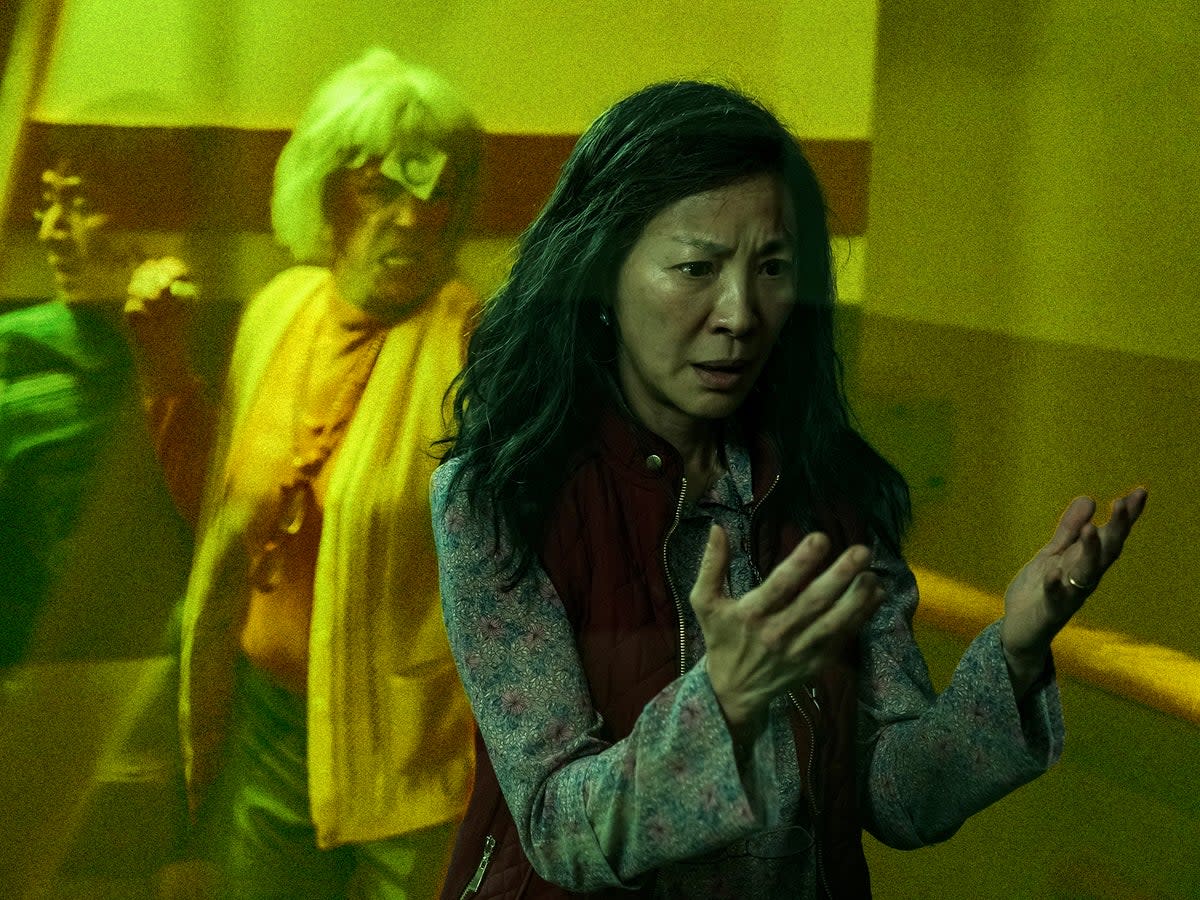Everything Everywhere All at Once: Why Michelle Yeoh’s wacky frontrunner deserved Best Picture

- Oops!Something went wrong.Please try again later.
- Oops!Something went wrong.Please try again later.
- Oops!Something went wrong.Please try again later.
You might say going in to bat for a frontrunner is boring and, typically, I’d agree – but when that frontrunner has spent decades as the underdog, boredom is a small price to pay for some overdue validation.
Don’t get me wrong: Everything Everywhere All at Once was never an underdog itself. Straight out the gate, the film – made on a relatively modest budget of £21m by directing dream team Daniel Kwan and Daniel Scheinert – was a huge success. Released last summer, the screwball comedy-drama was lavished with praise from all sides. They made good on that buzz this year, as the film swept awards season in remarkable fashion, turning out a slew of heartwarming acceptance speeches that have gone viral every time. With the most Oscar nods of any other nominee, the movie was hardly a dark horse – but until this year at least, a film like EEAO was a long shot.
Take its plot. This is a movie about a stressed-out, overstretched Chinese American immigrant who must save the multiverse from an all-consuming doom (a threat that is, by the way, embodied by a giant bagel). It’s fair to say, then, that EEAO is worlds away from the sort of prestige drama that usually gets the Academy going. It’s not even the sort of thing that usually gets me going. My bandwidth for silliness on screen is admittedly short, and a superhero-esque movie that features hot-dog fingers and universe-hopping technology sounds like a cringeworthy nightmare. And yet, EEAO won me over. More shocking still, it won the Academy over. It must be said, too, that I get satisfaction out of the knowledge that this board of notoriously stuffy film connoisseurs watched a fight sequence of two people trying to sit on a mystical butt plug and loved it. Maybe the starch is finally washing out of those collars.
EEAO is a lot of fun. And for once, the same could be said of much of its competition. This year, perhaps more than any other, the Academy has recognised films that audiences actually enjoyed. Alongside EEAO, fellow box office titans Top Gun: Maverick, Black Panther: Wakanda Forever and Avatar: The Way of Water have found their way into the illustrious category. While a strong case can be made for Tom Cruise’s universally adored, high-flying sequel to take home the prize, I would argue that, though EEAO has its naysayers, it hits something of a sweet spot for voters. To give it the win would say, “Hey! We’re cool! We’re with the times! We recognise commercial clout!” while still rewarding filmmaking ingenuity – because, yes, for all its Ratatouille-inspired sketches and sex-toy humour, it’s also very moving storytelling. Who knew a subtitled conversation between two rocks could make you cry?
It’s not for nothing that four of its stars received acting nods: Michelle Yeoh for Best Actress, Stephanie Hsu and Jamie Lee Curtis for Best Supporting Actress, and Ke Huy Quan for Best Supporting Actor. There’s not a weak link when it comes to the performances. Notably, Yeoh is given something new to chew on. In films such as Ang Lee’s Crouching Tiger, Hidden Dragon and James Bond flick Tomorrow Never Dies, she’s the embodiment of balletic beauty and slick refinement. Even recently, as the crazy rich mum in Crazy Rich Asians, she doesn’t have a hair out of place.
As Evelyn, though, Yeoh had the opportunity to flex in a different, messier role. And a starring one at that. Yeoh is one of the most recognisable Asian actors in the world, but EEAO is the first time the actor has topped a Hollywood call sheet. If we’re talking about overdue respect, look no further. Throw in Quan’s own comeback journey, from sidelined child star to Oscar nominee, and you have a narrative so uplifting even the sceptics can’t resist.
In a way, EEAO could have become a victim of its own success. In the past few months, it scooped up the coveted hat-trick (Directors Guild of America, Producers Guild of America and Screen Actors Guild) with endless red carpet photos and awards speeches splashed over front pages and timelines. At first glance, then, it looks like life has been smooth sailing for this indie flick. It’s easy to forget how far EEAO needed to come to get to this point and what a win represents. Don’t kid yourself: for all its fanfare, EEAO was still an underdog in this race. Not to mention, a worthy winner.

